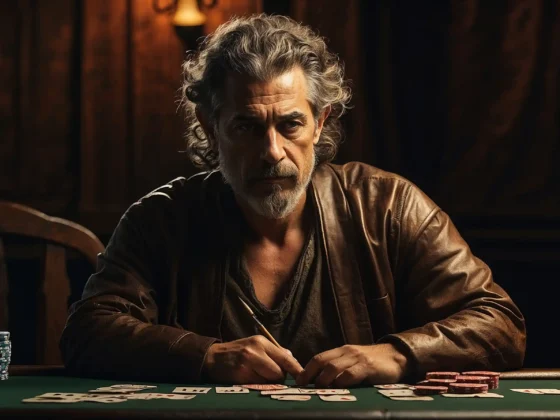Patience is not just a virtue; in poker, it is an absolute necessity. Whether you’re playing in high-stakes tournaments or casual home games, the ability to wait for the right moment to act—without giving in to impulses or distractions—can make the difference between winning and losing.
But patience in poker isn’t just about waiting for good cards; it’s about mastering your emotional responses, controlling your urges, and focusing on the long-term outcome. The same principles that make you successful at the poker table can be applied to life itself. By adopting a Stoic approach to patience, you can enhance your decision-making, increase your emotional control, and ultimately achieve long-term success both in poker and in life.
In this blog, we’ll explore how patience plays a key role in poker strategy and how Stoicism can help you cultivate it for better results at the table and beyond.
The Stoic View of Patience: Control What You Can
Patience, according to Stoic philosophy, isn’t just about passively waiting for things to happen. It is about actively choosing to maintain control over your thoughts, emotions, and reactions in the face of adversity or uncertainty. The Stoics believed in focusing on what’s within your control and letting go of what isn’t. In poker, this translates into focusing on your actions, your decisions, and your emotional state—rather than trying to control the cards or the behavior of your opponents.
1. Patience in the Face of Adversity
Poker is a game full of swings, with inevitable losses and bad beats. The Stoic philosopher Epictetus reminds us, “Wealth consists not in having great possessions, but in having few wants.” In poker, this can be understood as accepting variance and focusing on the process, rather than obsessing over results.
- Practical Tip: When faced with a tough hand or a losing streak, remind yourself that poker, like life, has its ups and downs. Focus on your decision-making process and stay patient. Understand that the outcome of one hand or one session does not define your overall performance.
2. Letting Go of Control
As a poker player, you cannot control the cards you are dealt or the decisions your opponents make. What you can control is your reaction to these factors. Stoicism teaches us to accept the things we cannot change and focus our energy on the aspects of life we can influence. By practicing this in poker, you’ll be able to remain calm under pressure and make more rational decisions.
- Practical Tip: If you experience a bad beat or a frustrating loss, take a moment to center yourself. Remind yourself that your job is to play your best game, not to obsess over the results. Breathe, reflect, and move on.
Patience in Poker Strategy: Playing the Long Game
In poker, patience isn’t just about enduring the game—it’s about strategically deciding when to act. It’s about understanding that the best time to make a move is often when the odds are in your favor, not when you’re feeling impatient or eager to take action. By learning to wait for the right opportunities and understanding the long-term nature of the game, you’ll become a more skilled player.
1. The Importance of Selective Aggression
Patience in poker isn’t about being passive or waiting for the perfect hand to come around. It’s about being selective with your aggression and knowing when to strike. By folding the weaker hands and waiting for the right opportunity, you’re setting yourself up for long-term success.
- Practical Tip: Avoid getting caught up in the excitement of the game. Play tight-aggressive—be selective in your hand choices and only make big moves when you’re confident in your position. The best players know when to fold and when to push.
2. Avoiding Tilt and Emotional Decisions
Tilt is a major factor that can destroy your poker strategy. It’s when emotions take over your decision-making, leading you to play recklessly or impulsively. Patience allows you to avoid tilt by keeping your emotions in check and staying focused on the long-term strategy.
- Practical Tip: If you start feeling frustrated or angry after a bad hand, take a break. Use deep-breathing techniques or meditation to clear your mind. Refocus and return to the table with a calm and patient mindset.
Stoicism and Patience: A Winning Combination for Life and Poker
While patience in poker is essential, the benefits extend far beyond the table. The Stoic practice of patience teaches us valuable lessons that can be applied to every aspect of life.
1. Patience in Personal Growth
In life, as in poker, we often have to wait for the results of our efforts. Growth and success are not immediate—they require time, perseverance, and a willingness to accept setbacks along the way. Just as you must remain patient in poker, you must remain patient in your personal journey, trusting that your hard work and decisions will pay off over time.
- Practical Tip: Cultivate patience by setting long-term goals and trusting the process. Whether it’s improving your poker game, advancing in your career, or improving your health, success takes time. Focus on making small, consistent progress and avoid getting discouraged by temporary setbacks.
2. Embracing Life’s Challenges with Patience
Stoicism teaches us that life is filled with challenges, and it’s our response to those challenges that determines our character. By practicing patience, we can face adversity with calm and resilience, rather than frustration or despair.
- Practical Tip: When faced with challenges in life, remind yourself that everything is temporary. Whether you’re dealing with a difficult situation or a setback in your poker game, the Stoic perspective teaches us to endure with patience and grace.
Conclusion: The Timeless Power of Patience
Patience is a cornerstone of both successful poker strategy and a fulfilling life. By embracing Stoic principles, you can cultivate the patience necessary to make wise decisions, avoid emotional pitfalls, and play the long game—both in poker and in life. Whether you’re at the poker table or navigating life’s challenges, remember that patience is not passive waiting; it is an active choice to focus on what you can control, to remain composed in the face of adversity, and to trust the process of growth.
By adopting the Stoic practice of patience, you’ll not only become a better poker player but also a more resilient and grounded person, prepared to handle whatever life throws your way.








